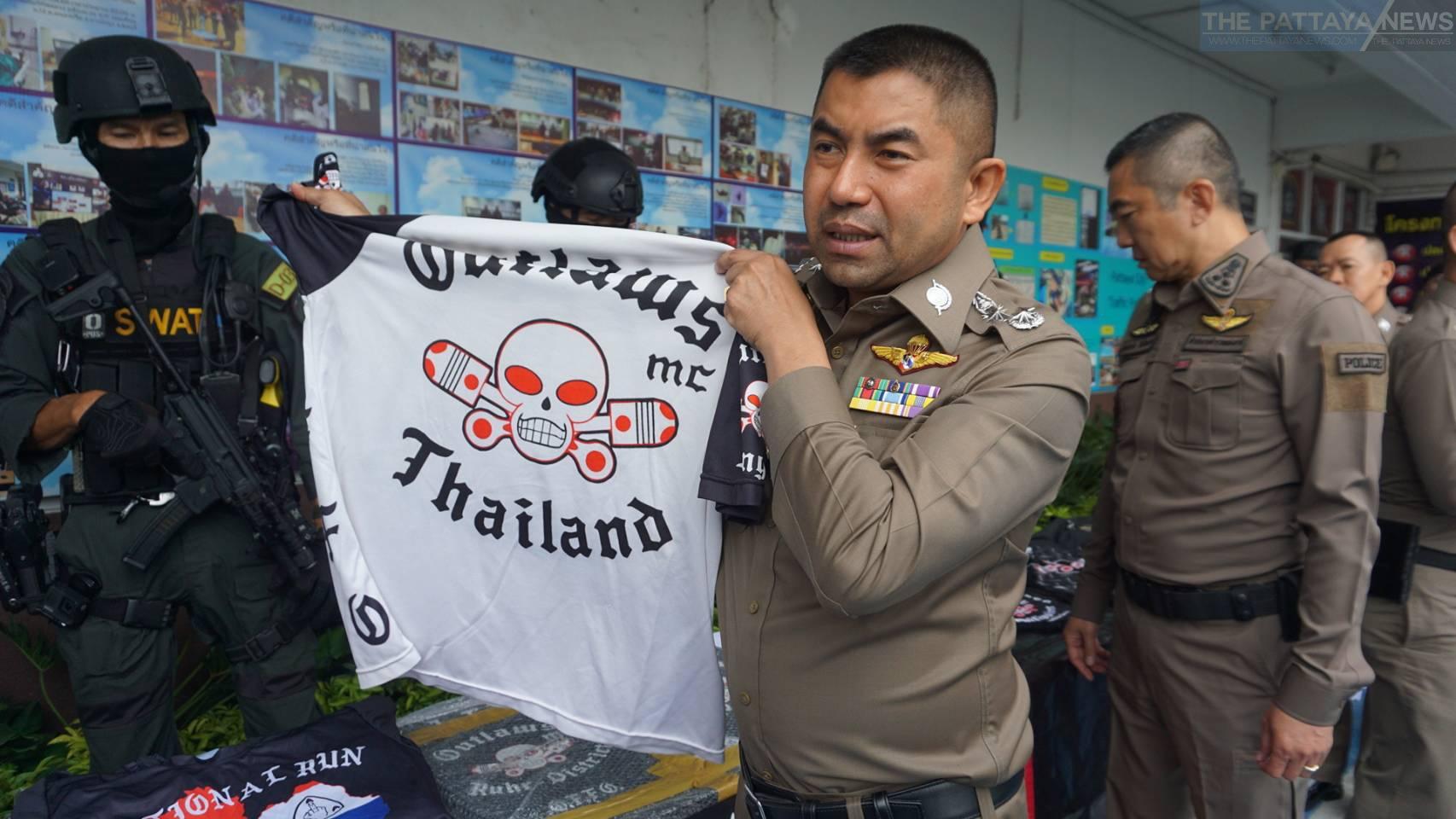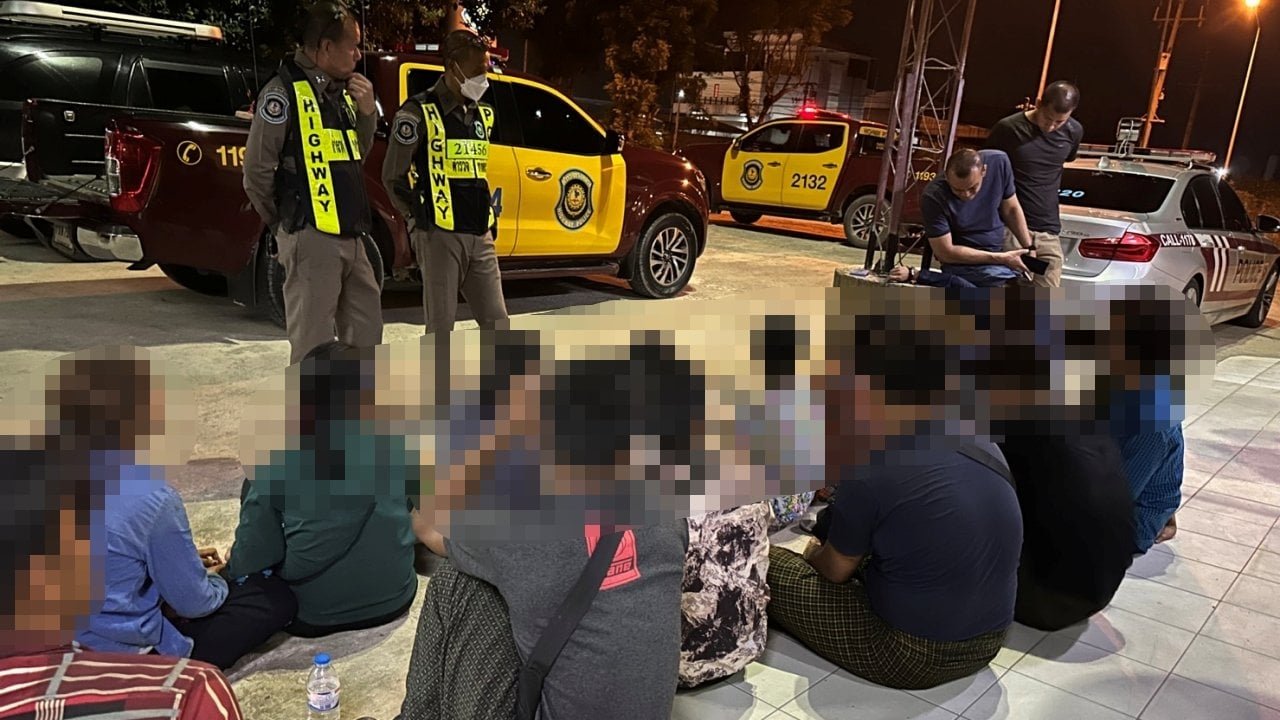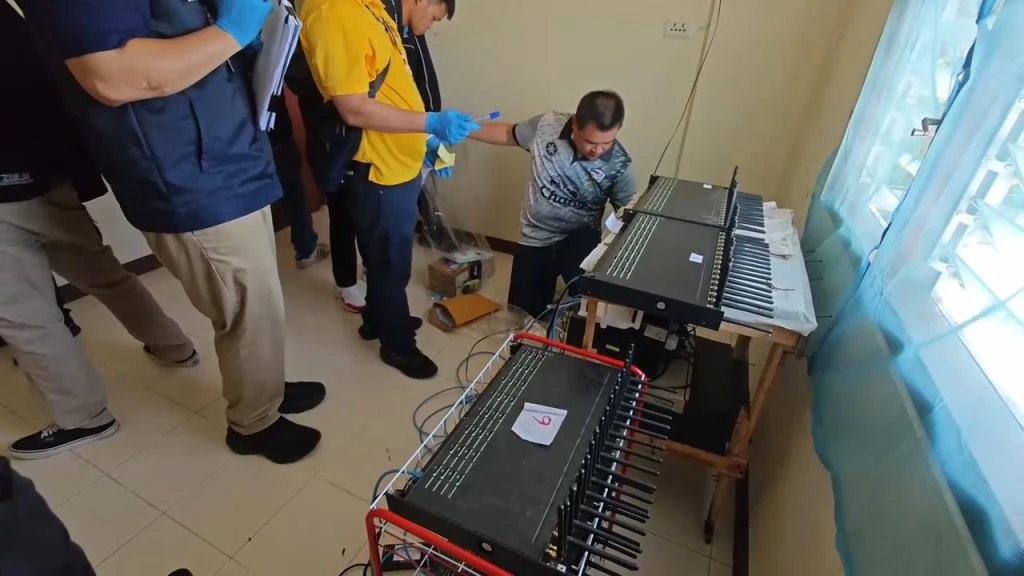Crime
Authorities in Thailand Seize Over $34 Million in Assets From Scam Gang Network

Authorities have seized over $34 million of assets from a major scam gang network linked to illegal online sports gambling, along with fraudulent activities during raids in three provinces in Thailand.
Thailand’s Minister of Digital Economy and Society, Prasert Chantararuangthong, told a news briefing that operations at 13 locations in Chiang Mai, Nonthaburi, and Bangkok resulted in a large-scale call centre network seizure.
The confiscated assets will be returned to the individuals identified in the first 54 cases. People who have fallen victim to scammers should file a claim with the Anti-Money Laundering Office (AMLO) within 90 days.
AMLO received information from the Royal Thai Police’s Economic Crime Suppression Division (ECSD) and broadened the investigation to confiscate the assets of those involved in economic crimes and fraudulent acts against Ms Thararat and her accomplices.
They were involved in various fraudulent activities, such as running call centre frauds, making random phone calls to fool the public, posing as officials, and duping victims into transferring money. They also used fictitious bank accounts and left cash trails connected to internet gambling websites.
They also engaged in online fraud through Facebook adverts, persuading people to swap Thai Baht for Chinese Yuan at rates lower than the official exchange rates. When the promised transactions were not placed, many victims were duped.
This operation seized 77 cars, 84 land titles, and 50 gold baht (1 Thai gold baht = 15.244 kilos). Money laundering charges have been filed against three people, with investigations scheduled to continue into other associated parties.
The owners of seized assets must explain the origins of their properties.

Foreign Criminal Gangs in Thailand
Foreign criminal organizations have established a foothold in Thailand, notably in bustling locations like Bangkok, Pattaya, Phuket, Chiang Mai, and Ko Samui.
Furthermore, border regions have become hotspots for these groups‘ activities, necessitating increased surveillance and preventive measures from authorities.
As Thailand grapples with the intricacies of transnational crime and the tenacious networks of organized gangs, it is critical to strengthen collaboration between law enforcement authorities and international partners.
The Thai mafia, often known as “Chao Pho,” poses a widespread threat throughout the country. These organized crime groups, frequently led by powerful personalities, have avoided harsh legal ramifications, raising questions about the judicial system’s effectiveness in limiting their activities.
Increased monitoring, targeted interventions, and legal reforms are critical in Thailand’s ongoing fight against organized crime.
The government has issued warnings about the growing number of contact centre scam gangs posing as official organizations and preying on naive citizens.
The alarming increase in scam attempts, with 7 out of 10 emails received by Thai individuals categorized as either scam or spam, emphasizes the critical need to address this issue.

Combatting criminal operations
These criminal groups use sophisticated strategies to trick people into sending large sums of money, resulting in enormous financial losses. Thai and US officials collaborated to apprehend offenders involved in multi-million dollar schemes.
Scam call centres use convincing strategies to deceive their victims, frequently posing as reputable companies to win trust. They use technical improvements to hide their genuine identities, making it difficult for authorities to detect and intercept their activities.
The use of coercion and misinformation hinders detecting and combatting criminal operations.
Misusing personal information and financial resources has weakened faith in telecommunications, necessitating strict safeguards to protect the public from falling victim to such frauds.
Law enforcement and regulatory organizations are stepping up their efforts to disrupt these criminal syndicates and hold the culprits accountable with new laws and expanded enforcement.
By Geoff Thomas

Crime
Police Officer Being Ordained at Temple Arrested for Running Scam Call Center

Police in Northern Thailand have arrested a fellow officer as he was being ordained at a temple in Ngao district of neighbouring Lampang province.
Pol Lt Col Bandit Khonkan chief inspector from the Hang Dong police station was disrobed and taken to the Chang Puak station in Chiang Mai. He was arrested on charges of running a call centre scam gang in Chiang Mai Province.
According to Thai Media Chiang Mai Provincial Police Region 5 obtained an arrest warrant for Pol Lt Col Bandit on Friday from the Chiang Mai Provincial Court for procuring illegal telecom equipment, setting up a station and using public airwaves to run a telecommunications business without permission.
Pol Lt Col Bandit reportedly told investigators that he was not the ringleader and was only a member of the gang with Chinese partners.
His arrest followed the apprehension of his 26-year-old daughter, Miss Wanuchapond, 26, and three others during raids at three housing projects in Chiang Mai on Friday, Pol Maj Gen Weerachon Boontawee, deputy chief of Provincial Police Region 5 told Thai media.
During the raids police police discovered around 12 GSM gateways, or SIM boxes, which are devices used for converting cellular networks into mobile phone numbers used domestically.
The chief inspectors daughter Miss Wanuchapond told the arresting officers that she was paid 8,000 baht a month at each of the three locations for renting thr rooms and monitoring devices.

She claimed she had no idea what the devices were and accepted the job because the pay was attractive.
Police investigators working with telecom regulators used a special tracking device to monitor the gang’s communications and learned that its base was in Myanmar opposite Mae Sai district of Chiang Rai.
The call center gang used the GSM gateways to make calls over the internet to scam people in Thailand out of million of baht.
The GSM gateways transmitting signals via SIM boxes to convert them into domestic phone numbers, duping victims into thinking they were being called from Thai government agencies.
Pol Maj Gen Weerachon said that each SIM box held 32 SIM cards, with a capacity of up to 300,000 calls a month. The seized devices had made fraudulent calls over 3.6 million times.
He said the their investigation is ongoing and they are working to track down the remaining conspirators, including Chinese and other Thai suspects.
Authorities are still deciding whether Pol Lt Col Bandit will be dismissed from the force, he said, adding that so far, no other officers are known to have been involved.

Meanwhile, Prime Minister Settha Thavisin has authorized the establishment of an emergency cyber center operated by the Royal Thai Police to combat transnational crimes committed by call center gangs along the Thai border in Chiang Rai province.
On July 19, Prime Minister Settha Thavisin directed the Center to combat information technology crimes. The Royal Thai Police (Royal Thai Police) will crack down on call center gangs in Myanmar, Laos, and along the border.
His directive comes as call center gangs ratchet up their scams to defraud people of their money, causing concern among Thais and jeopardizing the country’s economic and social stability.
Related Police News:
Machete Wielding Man Shot an Killed by Police in Chiang Rai
https://www.chiangraitimes.com/chiangrai-news/machete-wielding-man-shot-an-killed-by-police-in-chiang-rai/
Crime
Thai Immigration Police Arrest Colombian Tourists Over Home Invasions

Immigration police officers have arrested four Colombian nationals in connection with a series of home burglaries at luxury housing complexes in the Bangkok metropolitan area and Chiang Buri Province.
Pol Maj Gen Panthana Nuchanart, deputy commissioner of the Immigration Bureau, told a press briefing that three of the suspects were apprehended in Nonthaburi Province and the fourth in South Pattaya, Chon Buri Province.
According to the Bangkok Post, the Colombians were charged with stealing conspiracy and seized around 3 million baht (US$82,500.00).
According to Pol Maj Gen Panthana, the criminals rode motorcycles through housing estates, scoping out the properties and waiting for the owners to depart before committing their crimes.
He stated that all four of the accused denied any involvement in the home break-ins, but the arresting squad discovered evidence that implicated them.
Police called to home invasion
Meanwhile, police were dispatched to a luxury housing development in Tambon Nong Prue, Chonburi Province, after a Chinese man was attacked during a house invasion.
When they arrived, they discovered the house owner, Mr. Qian Peng Yi, visibly scared and with marks from being tied up with a cable. He informed police that three Chinese males broke into his home at 9 p.m., one of whom brandished a gun at him and directed him to his bedroom.
They bound his hands and feet, gagged him with fabric, taped his head, and forced him into the bed. The intruders then attempted to compel him into transferring 10 million baht in cryptocurrencies to them, endangering the life of his 33-year-old cousin who was in a second-floor bedroom.
While they scoured the house in search of riches, Mr. Peng Yi managed to flee and hide; he subsequently observed them leave with his cousin. Officials investigated the property and analyzed security camera footage from the incident and surrounding areas.
Around 9 p.m., a 30-year-old van driver came at the Bang Lamung police station after being contacted by an agency to carry Chinese customers from Pattaya to Suvarnabhumi Airport.
The driver informed authorities that he was supposed to pick them up at a motel about a kilometer from the Chinese businessman’s home. He then drove them to Bangkok’s Suvarnabhumi airport, arriving at 1 a.m. and receiving 1,800 baht.
The driver took a snapshot of the group smoking at the airport gate and identified one of them as the victim’s cousin. Police suspected coordination between her and the three suspects in her cousin’s heist, who all departed Thailand on the same aircraft.
Other Bangkok News:
Police in Bangkok Discover Six Vietnamese Tourists Dead in 5 Star Hotel
Police in Bangkok Discover Six Vietnamese Tourists Dead in 5 Star Hotel
Crime
Son of Thailand’s Leading Legal Scholar on Corruption Arrested for Running Online Gambling Network

The son of a former senator and leading economist and expert on corruption and gambling in Thailand has been arrested for on charges of running an online gambling network and its payment system.
Police from Thailand’s Technology Crime Suppression Division (TCSD) have confiscated assets worth more than (US$ 11.1 million) 400 million baht.
Narote Piriyarangsan, 33, was arrested following crackdowns in three sites around the city, according to Pol Maj Gen Athip Pongsiwapai, commander of the police Technology Crime Suppression Division (TCSD).
Mr Narote’s father, Sangsit Piriyarangsan, is an economist who has written articles and books about corruption and gambling. He was one of the appointed senators that were investigating the government’s intention to legalize casino gaming before their terms expired.
Police also detained 39-year-old Narayut Narakaew, the owner of the gambling website 69pgslot.com. The Criminal Court issued arrest warrants for the couple for operating an internet gambling service and money laundering.
According to the Bangkok Post, police seized two desktop computers, one laptop computer, 14 mobile phones, 21 bank passbooks, 53 ATM cards, and four high-end cars — a Ferrari 926 GTS, an Aston Martin, a Lexus, and a Subaru — totaling more than 400 million baht.
Police launched the inquiry after discovering the online gambling site, which accepted funds via an automatic deposit-withdrawal system through bank accounts and deposits in the AskMePay system. Players scanned the VPay QR code as well as the QR codes for Heng Online 888 or Heng Pay Company.
Police also discovered that payments received via QR code scans were transferred to the account of Heng Pay Co and then to the gambling website’s mule accounts using AskMePay, which did not use banks’ face recognition scanning. An inquiry indicated a monthly turnover of approximately 5 billion baht.
According to investigators, the website has been up and running for around four years, with the payment mechanism in use for roughly eight months.
According to Pol Maj Gen Athip, Mr Narote owns the gaming website’s payment systems and is the director of Heng Pay Co. After gathering evidence, authorities requested arrest warrants for 14 people.
Thailand does not allow almost any kind of gaming. Even though the law doesn’t say anything specific about online gaming, it is still considered gambling. The country has pretty strict rules about gambling. Thai punters can bet on the national lottery and horse races, but they can’t bet on any other types of games.
But it’s not a secret that there is a huge illegal gaming business in Thailand, even though it’s illegal.
The illegal casinos, online betting shops, underground lotteries, and pop-up bookies that take bets on everything from cockfights to Muay Thai make a shadow economy that is worth billions of dollars every year.
Related News:
Thailand’s Cyber Crime Police Raid Top Cops Home Over Gambling Websites
Thailand’s Cyber Crime Police Raid Top Cops Home Over Gambling Websites
-

 News3 years ago
News3 years agoLet’s Know About Ultra High Net Worth Individual
-
Entertainment2 years ago
Mabelle Prior: The Voice of Hope, Resilience, and Diversity Inspiring Generations
-

 Health4 years ago
Health4 years agoHow Much Ivermectin Should You Take?
-

 Tech2 years ago
Tech2 years agoTop Forex Brokers of 2023: Reviews and Analysis for Successful Trading
-

 Lifestyles3 years ago
Lifestyles3 years agoAries Soulmate Signs
-

 Movies2 years ago
Movies2 years agoWhat Should I Do If Disney Plus Keeps Logging Me Out of TV?
-

 Health3 years ago
Health3 years agoCan I Buy Ivermectin Without A Prescription in the USA?
-

 Learning3 years ago
Learning3 years agoVirtual Numbers: What Are They For?